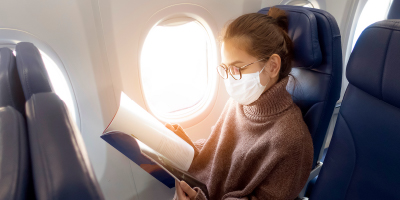Flu season is unpredictable, but activity often begins to increase in October, and we are expecting more flu cases this season. With elevated COVID-19 cases, you must get a flu vaccine for your well-being, especially if you will be taking off on a plane very soon. According to Business Insider, a person has roughly 80% chance of infecting everyone in their row and those in the rows directly in front and behind them.
Getting sick due to air travel is a common occurrence. And staying healthy during the cold and flu season is crucial for everyone’s health, as COVID-19 begins to rise again. The good news is that there are preventative measures that can be taken to protect your immune system. Continue reading to learn Dr. Farizani’s six tips for flying during flu season.
Before Your Trip
1. Get Vaccinated
Flu Vaccine
The Centers for Disease Control and Prevention strongly encourages every United States citizen, especially young kids, pregnant women, those over 65, and anyone with a chronic illness, to get the flu vaccine yearly. The flu shot is the number one precaution in preventing contracting the flu during air travel or in general. The flu vaccine used in the Northern Hemisphere usually protects against the main viruses circulating in other parts of the world. However, CDC recommends getting your flu vaccine at least two weeks before the trip as it takes two weeks for vaccine immunity to develop after vaccination.
If you are interested in booking an appointment to receive the flu vaccine before your air travel, look no further than Hillcroft Physicians. Dr. Farizani and her incredible team perform general services focusing on all aspects of family medicine, from pediatrics to geriatrics. Our team can diagnose and treat a variety of symptoms and conditions, and we can diagnose the flu with a rapid flu test available on-site.
Covid-19 Vaccine
If you still haven’t gotten your COVID-19 vaccine, don’t worry about receiving both of the vaccines at the same time. The Centers for Disease Control and Prevention has reported that flu vaccines and COVID-19 vaccines can be administered simultaneously. The best way to protect yourself from the flu is to receive both of these vaccines. Keep your immune system safe from the virus.
2. Check Travel Requirements
According to the Centers for Disease Control and Prevention, the risk for exposure to influenza during travel depends somewhat on the time of year and destination. This is why it’s imperative to check travel requirements. The CDC recommends investigating current flu activity in your travel region by checking their flu activity site, which provides updated information on seasonal flu activity throughout the world.
3. Book your Seat Carefully
When buying your air travel tickets, make sure to book your airplane seat carefully. Studies have shown that aisle seats experience significantly more traffic and run a greater risk of exposure. On the other hand, window seats are the best option because they have less contact with other passengers. It’s important to remember that airplane passengers have an 80% chance of getting sick on a flight if they sit in the wrong spot.
Furthermore, travelers may want to be proactive when booking flights. Some airlines are minimizing passenger and flight attendant interactions and are reducing flight capacity.
During Your Trip
4. Take Vitamins
Prescribed medication and vitamins can support your immune system through the cold and flu season. Consider taking zinc lozenges as it can help prevent the spread of respiratory viruses, and Vitamin D supplements as low levels of Vitamin D can affect your immune strength. However, vitamin C supplements like Emergen-C and Airborne have not been proven effective as preventive measures, but when taken at the onset of symptoms, they may reduce your downtime.
At Hillcroft Physicians, we have our Hillcroft Pharmacy that provides cost-effective & convenient prescription dispensary services. Staying healthy means taking any preventative medication that will help your immune system during air travel. We refill prescriptions quickly and easily, so you never miss a flight.
5. Wear a Mask
Wearing a mask has become a regularity in our lives and is required during air travel. The Centers for Disease Control and Prevention have said that face masks are most effective when worn by a sick person. It helps prevent any shedding virus particles from spreading to others.
CDC recommends that during periods of increased acute respiratory infections in the community, coughing patients, people suspected of having influenza, and anyone around them should wear a mask at all times until they are isolated in a private room. They found that the use of face masks on-board was associated with a 70% reduced risk.
6. Do the Basics
Washing your Hands
Washing your hands is key to ridding yourself of germs and bacteria. This is especially important when traveling. The CDC recommends an alcohol-based hand sanitizer with 60% to 95% alcohol content, such as Purell. Although your hands are clean, please avoid touching your face. When you touch your face, the germs on your hands can enter your mucous membranes and likely get the flu.
Cover Your Mouth when Coughing or Sneezing
Covering your mouth when coughing or sneezing is taught to you as a child; specifically the “vampire cough” where you cough or sneeze into your elbow. Something as simple as this or using a tissue helps prevent the spread of bacteria and viruses. The Center for Disease Control and Prevention has stated that flu viruses are spread mainly by droplets made when people cough, sneeze or talk.
Stay Hydrated
Onboard air humidity is about 15%, but between 30% and 60% humidity on land. The low humidity on the airplane can dry out the mucous membranes of your nose and airways. When these tissues dry out, they are much more susceptible to the flu. Staying hydrated is the best solution to combat this; drink 8 ounces of water per hour you’re in the air to maintain your hydration.
Fight the Flu with Hillcroft Physicians
As we approach the end of the year and holiday season, people are preparing for air travel to visit their loved ones, but it’s essential to prevent the spread while doing so. Flying can cause flu symptoms to worsen, and the experience can be highly unpleasant. However, with Dr. Farizani’s six tips for flying during the flu season, you have a higher chance of staying healthy.
At Hillcroft Physicians, we understand the importance of fighting the cold and flu season, especially since the Center for Disease Control and Prevention reported that it is possible to attain the flu and COVID-19 at the same time. Dr. Farizani has over 23 years of experience and is committed to providing excellent medical assistance to make a difference in your health and wellness. Hillcroft Physicians is committed to helping you stay healthy when flying during the flu season. Contact us today!


